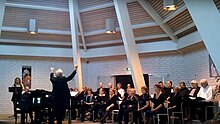Antoine Oomen
Antoine Oomen (born January 1, 1945 in Amsterdam ) is a Dutch pianist , composer and conductor .
Adolescent years
Antoine Oomen sang from 1951 to 1955 as a choirboy in the Jozefkerk in Amsterdam. From 1955 to 1958 he was organist at the Amsterdam Duifkerk and from 1958 to 1963 at the Amsterdam Chassékerk . During his school days at the Ignatius College in Amsterdam, he was also the school's organist. The music teacher at this school was the composer and church musician Bernard Huijbers . From 1961 until today, Antoine Oomen is organist, pianist, choir director and resident composer at the Amsterdam Student Church.
education
Given this career in the church sector from an early age, it was only logical that Antoine Oomen should study piano at the Conservatory in Amsterdam. He performed a large part of his life at home and abroad until composing took up all of his time.
Compositions
His work comprises more than three hundred song compositions on texts by Huub Oosterhuis , which were commissioned by the Stichting Leerhuis en Liturgie . He is the composer of The Song of the Resurrection ( Let the steppe bloom ), which was voted the most beautiful Dutch hymn in June 2006, and of the Song to the Light ( light that touches us, early in the morning ), which it was in the same election also made it into the top ten (seventh place). In the early 1990s Oomen founded the Koor voor nieuwe Nederlandse religieuze muziek (Choir for New Dutch Music), with which he records CDs of his compositions and regularly organizes liturgical concerts. Current examples are Om leven dat doorgaat. Een psalmensymfonie , published in 2005, Een mens te zijn op aarde (To be a person on earth), 2007, Psalm 119 , 2008 and Dat een nieuwe wereld komen zal (That the new world may still come), 2010.
Significance for Dutch church music
As a composer of church music and as a practicing church musician, Antoine Oomen is a great role model for many church choirs . His church music, as it was developed to this day in the Amsterdam Student Church and until around 1980 under the patronage of the Amsterdamse Werkgroep voor Volkstaalliturgie (Amsterdam working group for native-speaking liturgy), can be excelled by amateur choirs of medium and good performance in ordinary Roman Catholic and Protestant churches in the Netherlands. In Germany, too, his works are performed by a large number of choirs - especially in the context of worship. It is characteristic of his works that they are completely oriented towards the text and the possibility of congregational singing. It is precisely this good balance of text and melody in his compositions that so appeals to many worshipers. The piano accompaniment demands a lot of skill and even some virtuosity from the pianist . For a number of his most important works, Oomen has also created choral movements with organ accompaniment.
Antoine Oomen, together with Tom Löwenthal and Chris Fictoor, as composer and interpreter of church music, belongs to the new generation of church musicians of the last decades after Bernard Huijbers , who through their compositions gave shape to the further renewal of the liturgy in the Roman Catholic Church .
Web links
| personal data | |
|---|---|
| SURNAME | Oomen, Antoine |
| BRIEF DESCRIPTION | Dutch pianist, composer and conductor |
| DATE OF BIRTH | January 1, 1945 |
| PLACE OF BIRTH | Amsterdam |
